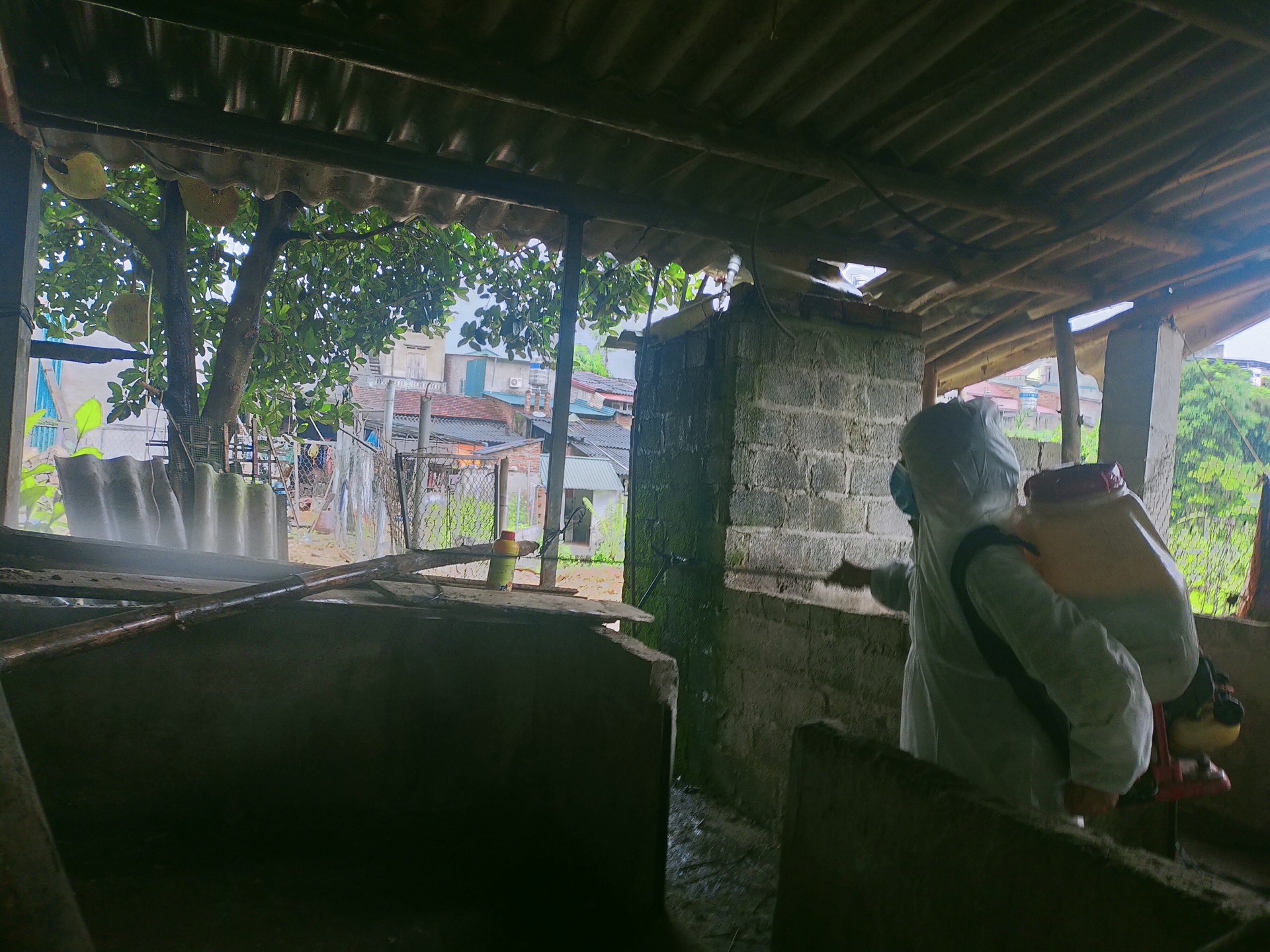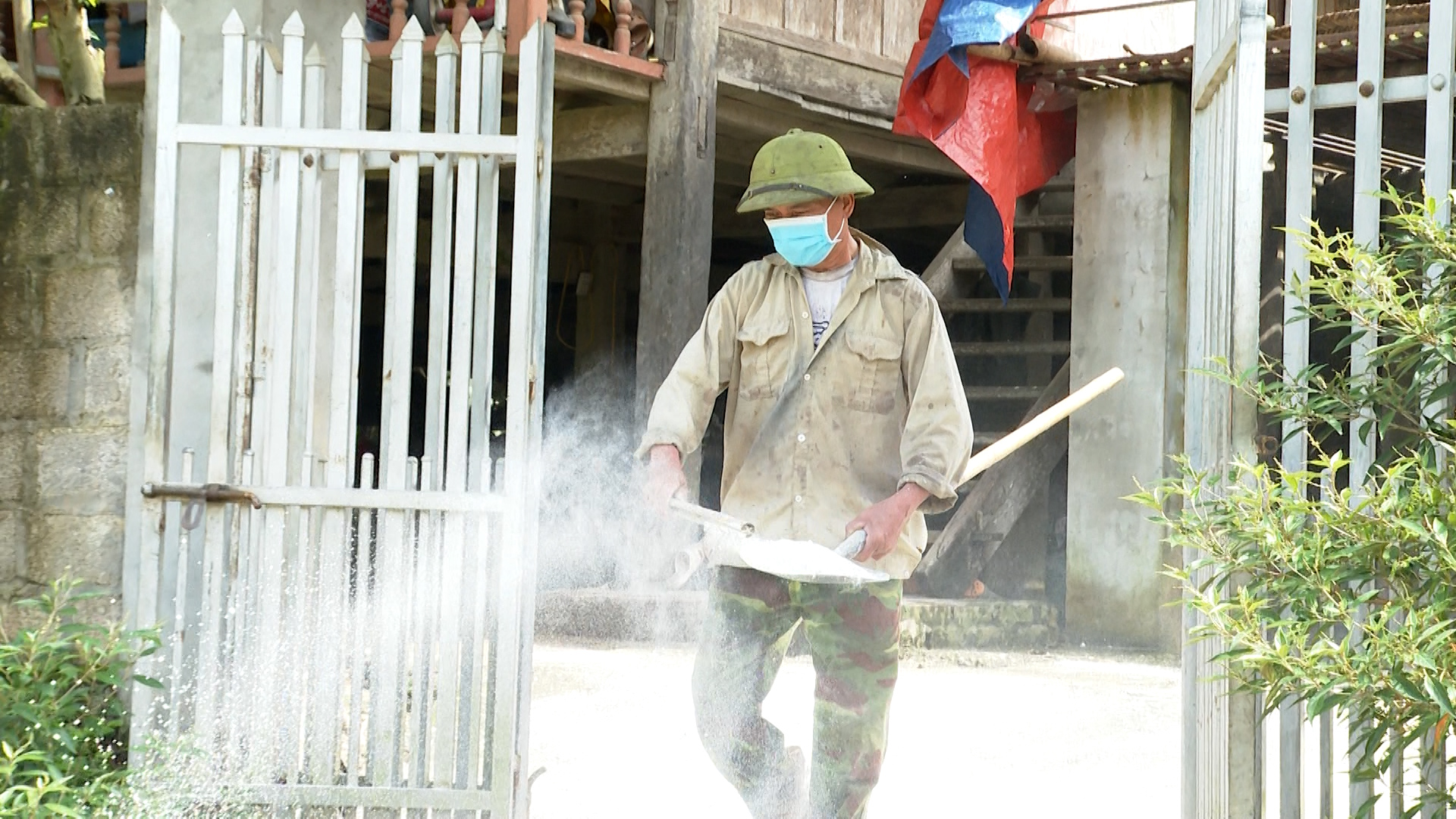November 27, 2025 | 23:55 GMT +7
November 27, 2025 | 23:55 GMT +7
Hotline: 0913.378.918
November 27, 2025 | 23:55 GMT +7
Hotline: 0913.378.918

Mrs. Trieu Thi Gia disinfecting the barn before raising new herds of pigs. Photo: Ngoc Tu.
These days, Mrs. Trieu Thi Gia from Phu Thong (Bach Thong district) is preparing her livestock pens to raise a new batch of pigs. Thanks to her diligent disease prevention efforts, the previous batch of pigs was successfully sold according to the plan. Similar to many other livestock farmers, although her livestock farming is small-scale, with only a few female pigs raised each year, the income generated contributes to covering some expenses in her family.
Mrs. Gia emphasized that pig farming requires meticulous attention to disinfection procedures and providing separate areas for pig raising. Due to the complicated spread of African Swine Fever, she explained that before starting the family's pig farming, disinfection is conducted twice, and the pig pens are kept clean. Additionally, the family administers recommended vaccines to prevent diseases among the pig herd.
At present, the total pig population in Bach Thong district amounts to approximately 20,000, with most households engaged in small-scale pig farming, making disease prevention challenging. Many households have not paid enough attention to disease prevention measures, particularly maintaining proper hygiene in pig pens, isolating potential sources of infection, and conducting synchronized disinfection on a larger scale.
Mr. Lang Van Thuy, the Director of the Agricultural Service Center in Bach Thong district, mentioned that due to the presence of African Swine Fever in neighboring districts, their institution has dispatched veterinary officers to each hamlet and village to promote and guide residents in carrying out disinfection and detoxification of their pig pens according to the correct procedures. They also maintain regular inspection and monitoring of veterinary hygiene at markets along the National Highway 3.
Information from the Department of Animal Husbandry and Veterinary of Bac Kan province revealed that by the beginning of July 2023, the entire province had conducted disinfection and detoxification of pig pens, livestock farming areas, village roads, and alleys. Approximately 3,700 liters of chemicals were used for this purpose.
Furthermore, due to the occurrence of multiple outbreaks of African Swine Fever, Foot-and-Mouth Disease, and Rabies among animals in the province in 2022, the Department of Veterinary (Ministry of Agriculture and Rural Development) provided the province with 10,000 liters of Han-Iodine 10% disinfection chemicals from the national reserve to support disease prevention efforts.
The disinfection chemicals have been efficiently distributed across different districts, cities, and local areas to ensure thorough and widespread disinfection efforts. This proactive measure aims to effectively prevent the potential outbreak of diseases and safeguard the health of both livestock and the local community.

Disinfection is an essential solution to prevent disease. Photo: Quang Linh.
In Bac Kan, after a year of absence, outbreaks of African Swine Fever have recently reappeared in the districts of Na Ri and Pac Nam. Although the disease hasn't spread widely yet, it has caused concerns among livestock farmers. Many households are hesitant to restock their herds, and some have reduced the scale of their livestock farming.
Mr. Sam Van Hoat, the Director of the Agricultural Service Center in Pac Nam district, mentioned that due to the mountainous terrain and small-scale livestock farming, implementing consistent disease prevention measures is challenging, especially in remote and deep-lying areas.
Currently, specialized agencies and local authorities are intensifying their efforts to raise awareness among livestock farmers about the seriousness of the disease in livestock and encouraging safe practices in livestock rearing.
"One of the current challenges is that some communes in Pac Nam district do not have full-time veterinary staff, and some are part-time, which affects disease prevention work. Additionally, the direct funding for those participating in disease prevention is still relatively low", shared Mr. Hoat.
Aside from the African Swine Fever, this year, proactive disease prevention measures have helped Bac Kan avoid disease outbreaks in livestock, and the poultry sector has also shown good development. The first round of vaccination against Foot-and-Mouth Disease and Hemorrhagic Septicemia for buffalo and cattle has achieved over 80% of the planned coverage.
Currently, the livestock population (buffaloes, cattle, horses) in Bac Kan province is around 63,000, while there are 165,000 pigs and over 21,000 goats. By the first six months of 2023, the total output of various types of livestock meat reached more than 12,000 tons.
Translated by Nguyen Hai Long

(VAN) According to Mr. Vo Minh Thanh, Director of the Tay Ninh Department of Agriculture and Environment, Resolution 57 has created a new development pathway for the locality, shifting from traditional toward modern agriculture.
/2025/11/26/4909-2-154329_878.jpg)
(VAN) Pearl grouper farming in HDPE cages not only delivers economic efficiency but also contributes to protecting the environment, creating jobs, and promoting marine-based experiential tourism.

(VAN) The model of making a living under the forest canopy through the agroforestry system in Van Son commune, Bac Ninh province, is expected to generate an annual income of approximately VND 30 million/ha.

(VAN) Many enterprises in Can Tho are harnessing natural energy and reducing greenhouse gas emissions in their production processes, thereby contributing to the promotion of a sustainable green transition.
/2025/11/24/3536-2-112800_176.jpg)
(VAN) Dong Nai now has tens of thousands of hectares of forests certified for sustainable management, and this area will continue to be expanded in the coming period.

(VAN) Vinh Ha hamlet (Dai Xuyen commune, Hanoi) is shifting away from small-scale farming as households adopt bioscurity into their breeder chicken models.

(VAN) Heavy rains make aquatic species more vulnerable to disease. Proactive water management and high-tech systems help farmers prevent outbreaks and protect yields.